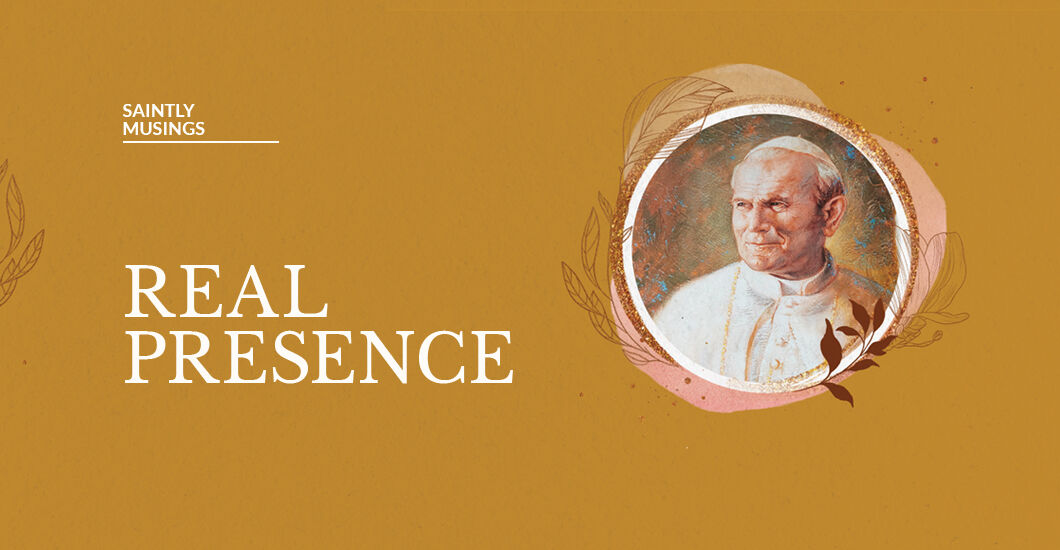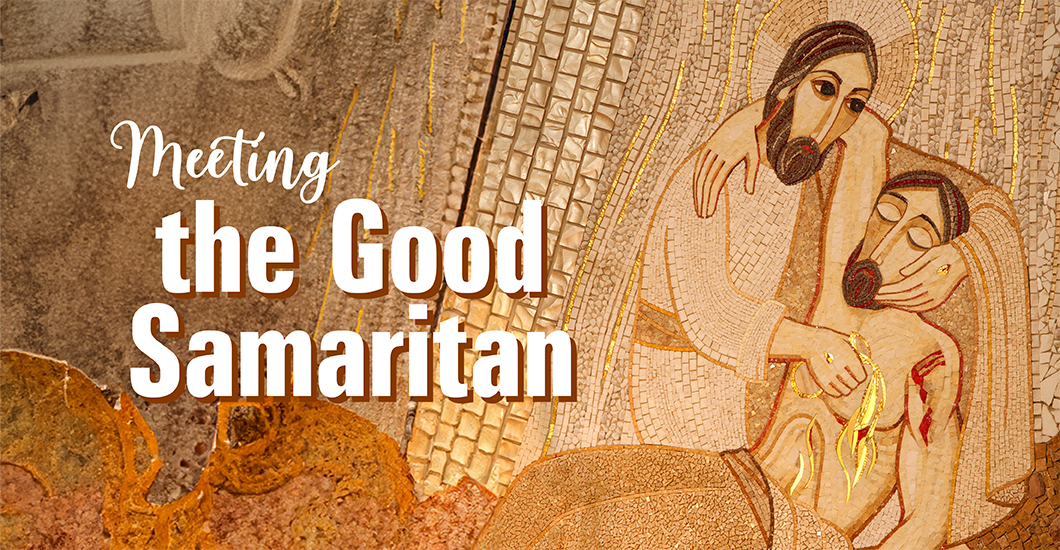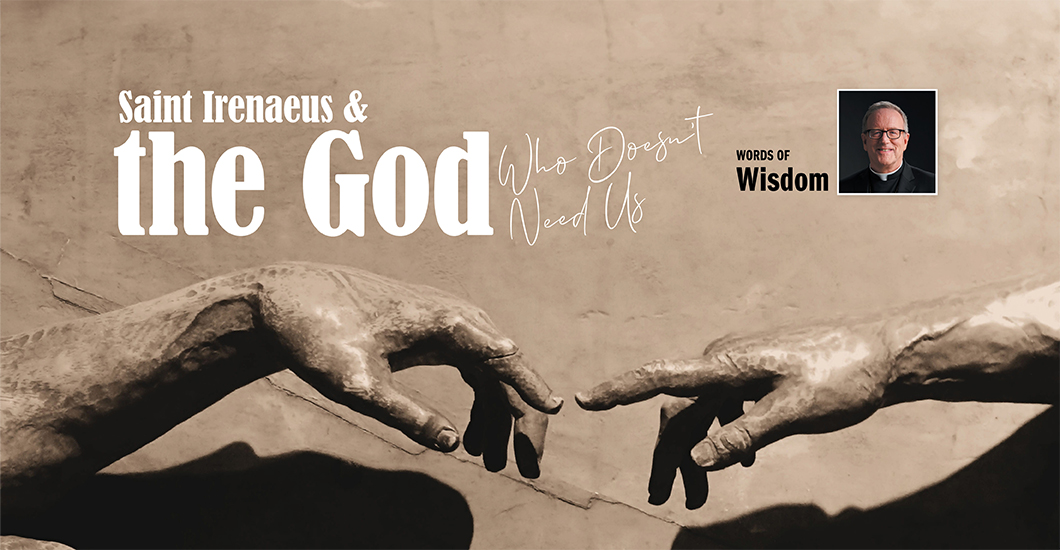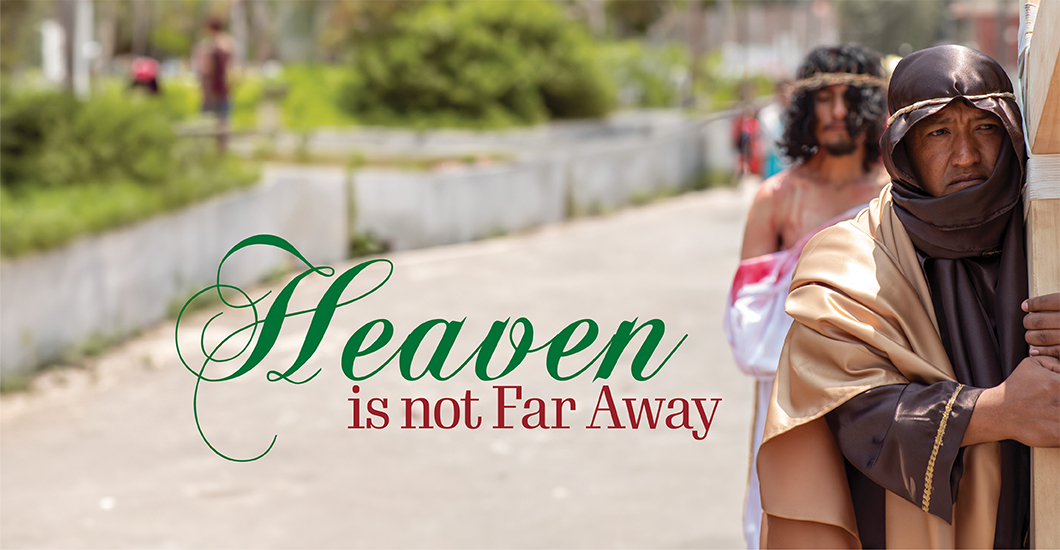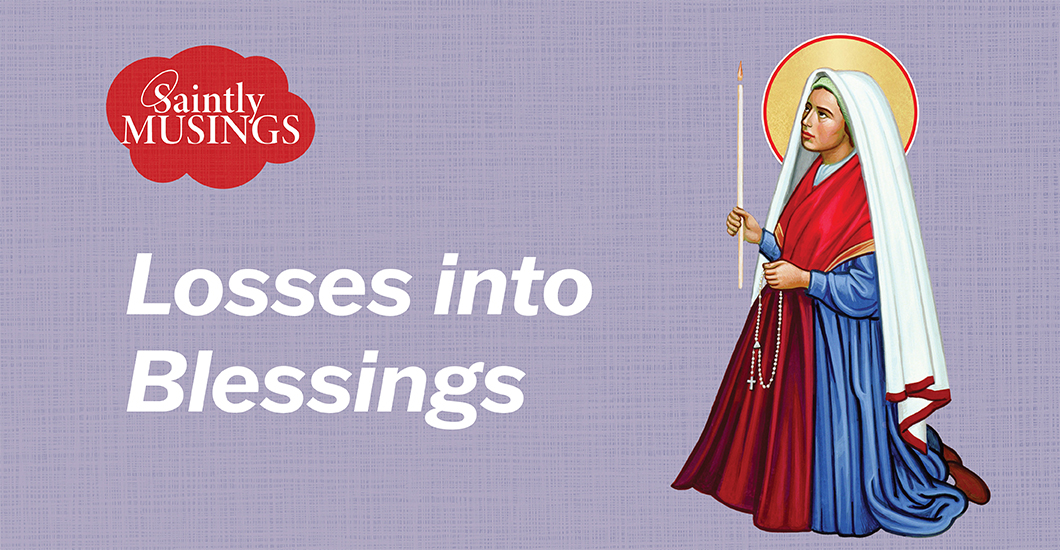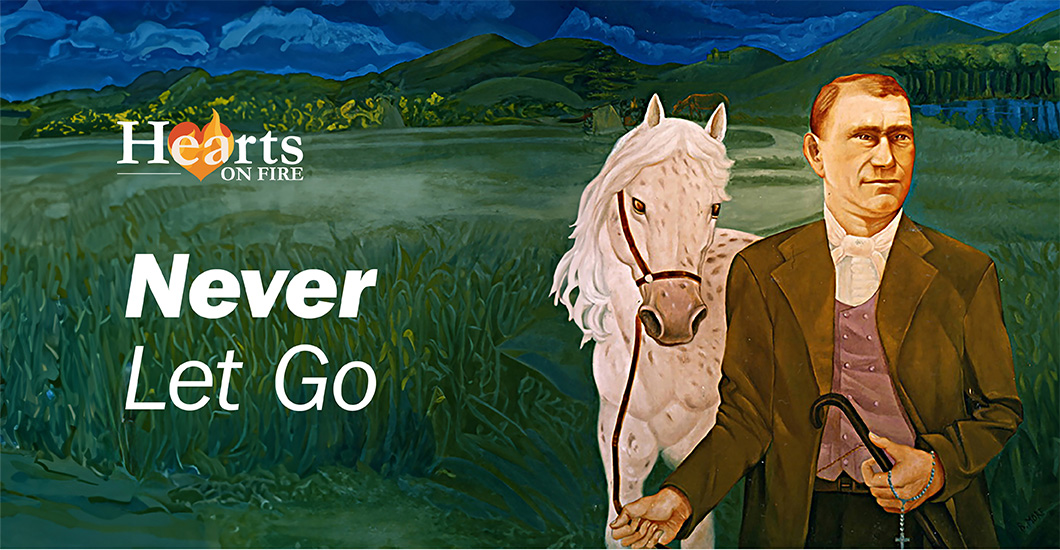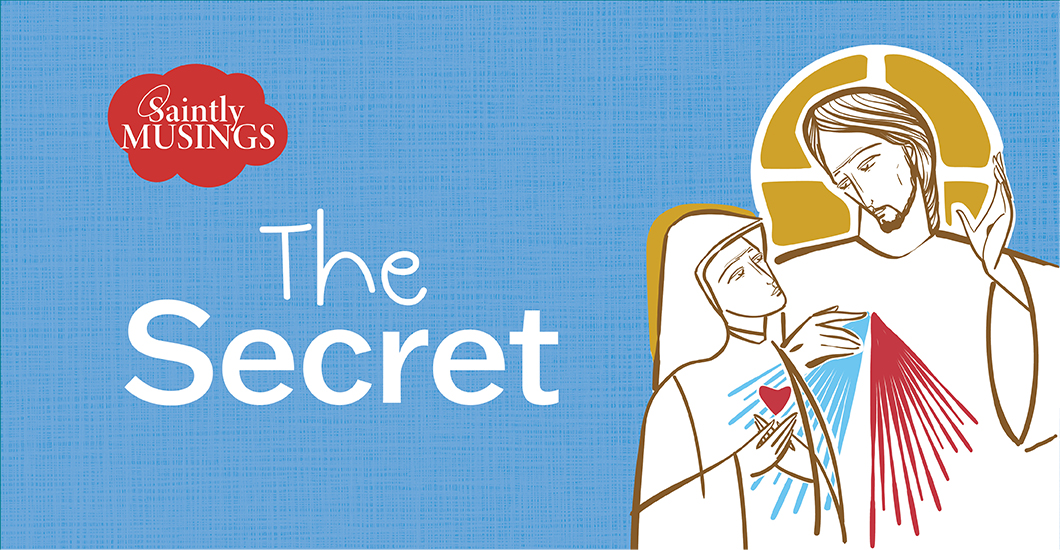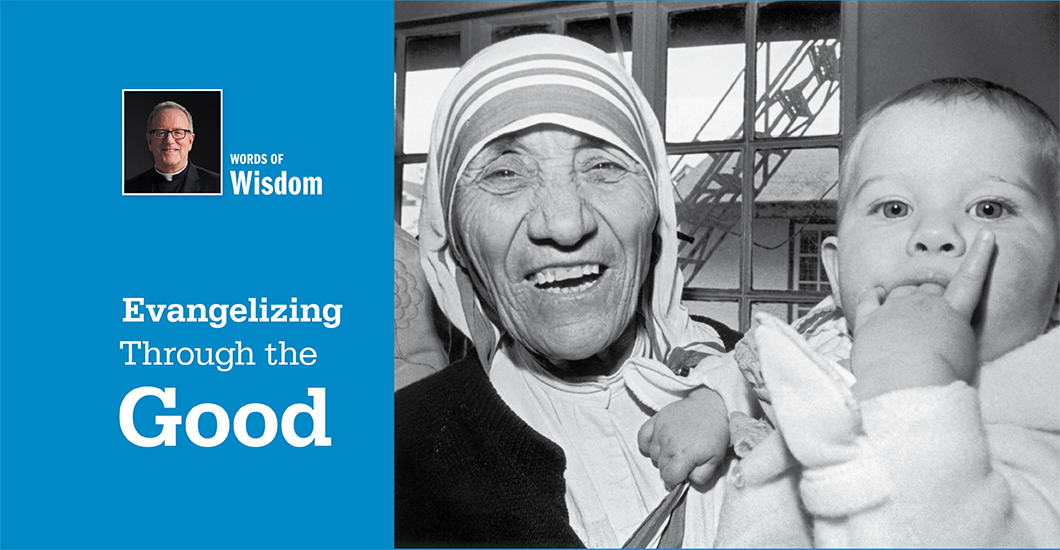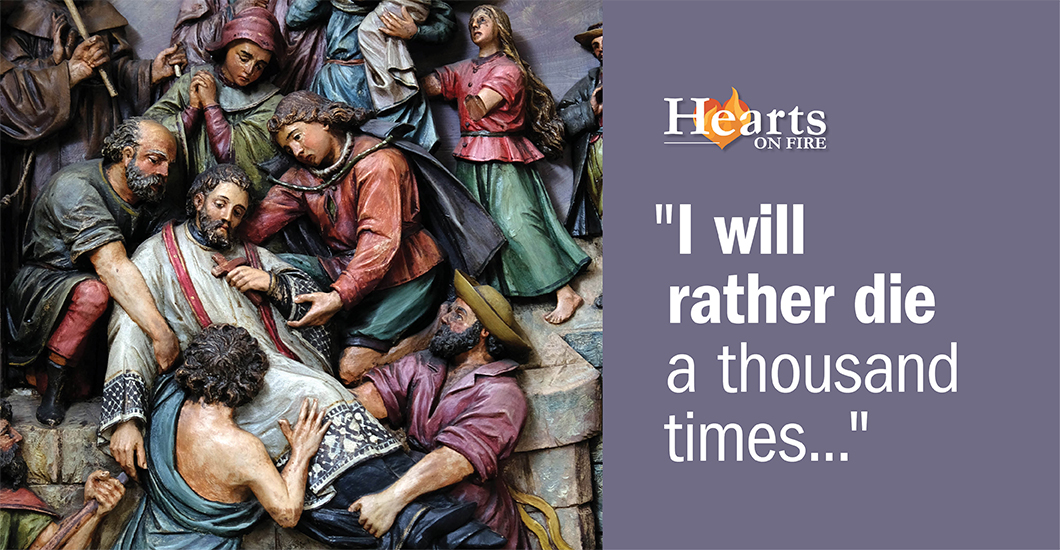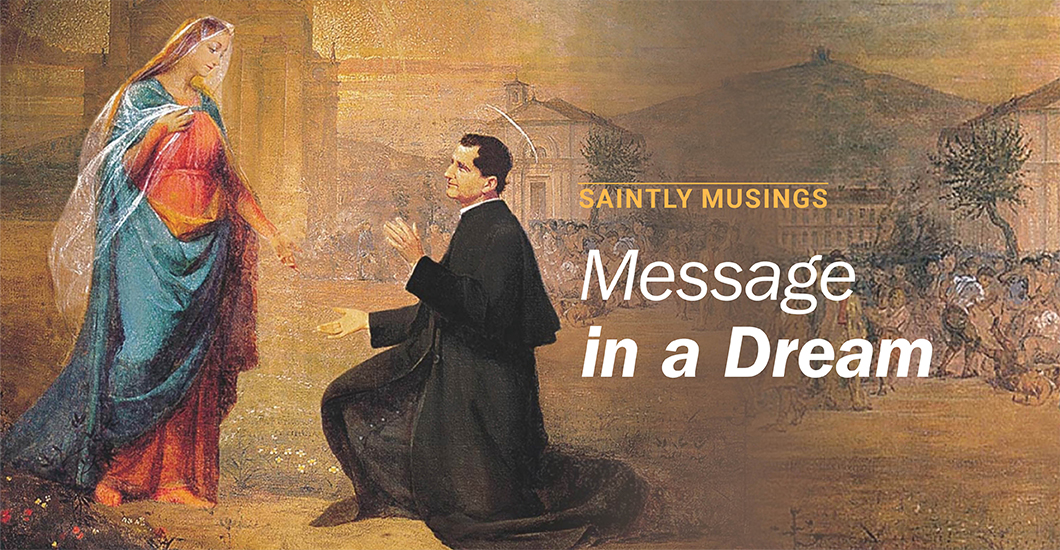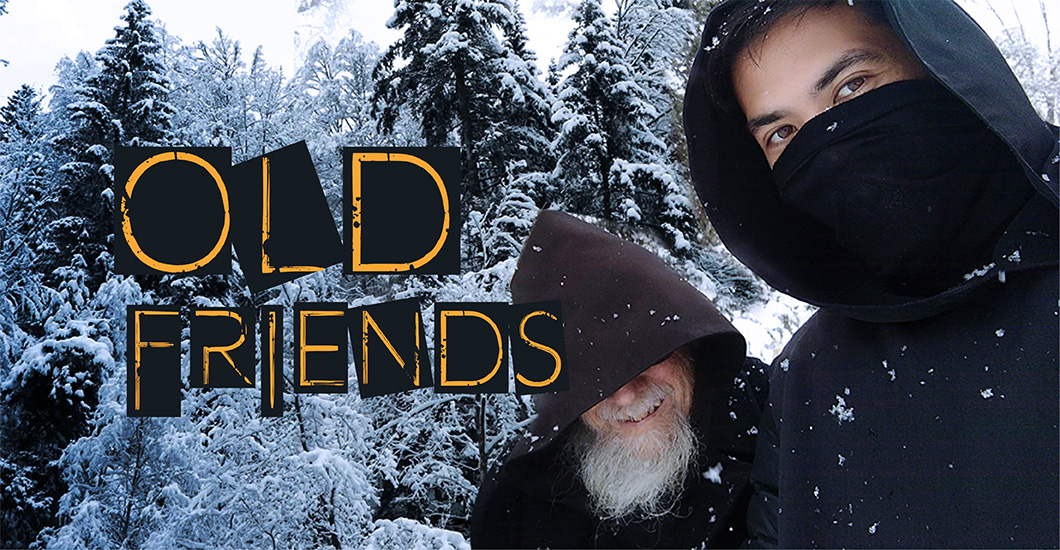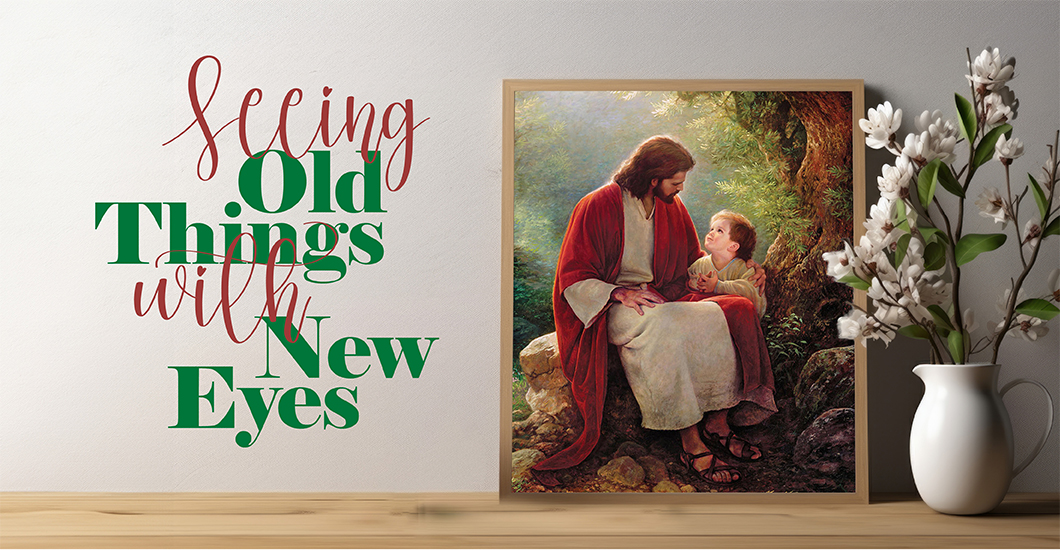Trending Articles
Saintly Musings: Real Presence
Is there such a thing as Eucharistic Sensitivity? Perhaps this anecdote regarding Pope John Paul II can answer the question.
During a trip to the State of Maryland, Pope John Paul II was scheduled to walk down a hallway in the archbishop’s residence. Along that hallway was the entrance to a chapel where the Blessed Sacrament was reserved. The papal organizer ensured that nothing indicated the door led to the chapel as he knew John Paul would certainly step inside to pay a visit to the Lord, thus significantly derailing the schedule.
On the day of the pilgrimage, Pope John Paul walked past the door and stopped. He wagged his finger at the papal organizer, opened the door of the chapel, entered and knelt to pray. One of the priests who witnessed the event commented in amazement, “He’s never been in this place before, never set eyes on the place, and there was nothing about the door that distinguished it in any way as a chapel. It was just one more door in a corridor of doors. But he turned right back around, he opened that door, and went into the chapel, and he prayed.”
Out of his intense relationship with the Eucharist, came the incredible gift of Eucharistic sensitivity. The late Holy Father teaches us a lesson regarding the desires of our heart. When our desire is great, our awareness of, and sensitivity to, that which we desire increases greatly. Let us pray that the good Lord helps us grow in our desire for him and inspires us to make time regularly to spend alone with Him in the Blessed Sacrament.
Shalom Tidings
Related Articles
Several years ago, I participated in the annual meeting of the Academy of Catholic Theology, a group of about fifty theologians dedicated to thinking according to the mind of the Church. Our general topic was the Trinity, and I had been invited to give one of the papers. I chose to focus on the work of Saint Irenaeus, one of the earliest and most important of the fathers of the Church. Irenaeus was born around 125 in the town of Smyrna in Asia Minor. As a young man, he became a disciple of Polycarp who, in turn, had been a student of John the Evangelist. Later in life, Irenaeus journeyed to Rome and eventually to Lyons where he became Bishop after the martyrdom of the previous leader. Irenaeus died around the year 200, most likely as a martyr, though the exact details of his death are lost to history. His theological masterpiece is called Adversus Haereses (Against the Heresies), but it is much more than a refutation of the major objections to Christian faith in his time. It is one of the most impressive expressions of Christian doctrine in the history of the church, easily ranking with the De Trinitate of Saint Augustine and the Summa theologiae of Saint Thomas Aquinas. In my Washington paper, I argued that the master idea in Irenaeus’s theology is that God has no need of anything outside of Himself. I realize that this seems, at first blush, rather discouraging, but if we follow Irenaeus’s lead, we see how, spiritually speaking, it opens up a whole new world. Irenaeus knew all about the pagan gods and goddesses who stood in desperate need of human praise and sacrifice, and he saw that a chief consequence of this theology is that people lived in fear. Since the gods needed us, they were wont to manipulate us to satisfy their desires, and if they were not sufficiently honored, they could (and would) lash out. But the God of the Bible, who is utterly perfect in Himself, has no need of anything at all. Even in His great act of making the universe, He doesn’t require any pre-existing material with which to work; rather (and Irenaeus was the first major Christian theologian to see this), He creates the universe ex nihilo (from nothing). And precisely because He doesn’t need the world, He makes the world in a sheerly generous act of love. Love, as I never tire of repeating, is not primarily a feeling or a sentiment, but instead an act of the will. It is to will the good of the other as other. Well, the God who has no self-interest at all, can only love. From this intuition, the whole theology of Irenaeus flows. God creates the cosmos in an explosion of generosity, giving rise to myriad plants, animals, planets, stars, angels, and human beings, all designed to reflect some aspect of His own splendor. Irenaeus loves to ring the changes on the metaphor of God as artist. Each element of creation is like a color applied to the canvas or a stone in the mosaic, or a note in an overarching harmony. If we can’t appreciate the consonance of the many features of God’s universe, it is only because our minds are too small to take in the Master’s design. And His entire purpose in creating this symphonic order is to allow other realities to participate in His perfection. At the summit of God’s physical creation stands the human being, loved into existence as all things are, but invited to participate even more fully in God’s perfection by loving his Creator in return. The most oft-cited quote from Irenaeus is from the fourth book of the Adversus Haereses, and it runs as follows: “The glory of God is a human being fully alive.” Do you see how this is precisely correlative to the assertion that God needs nothing? The glory of the pagan gods and goddesses was not a human being fully alive, but rather a human being in submission, a human being doing what he’s been commanded to do. But the true God doesn’t play such manipulative games. He finds His joy in willing, in the fullest measure, our good. One of the most beautiful and intriguing of Irenaeus’ ideas is that God functions as a sort of benevolent teacher, gradually educating the human race in the ways of love. He imagined Adam and Eve, not so much as adults endowed with every spiritual and intellectual perfection, but more as children or teenagers, inevitably awkward in their expression of freedom. The long history of salvation is, therefore, God’s patient attempt to train His human creatures to be His friends. All of the covenants, laws, commandments, and rituals of both ancient Israel and the church should be seen in this light: not arbitrary impositions, but the structure that the Father God gives to order His children toward full flourishing. There is much that we can learn from this ancient master of the Christian faith, especially concerning the good news of the God who doesn’t need us!
By: Bishop Robert Barron
MoreAre you quick to judge others? Are you hesitant to help someone in need? Then, it’s time to reflect! It was just another day for me. Returning from the market, weary from the day’s labor, collecting Roofus from the Synagogue school… However, something felt different that day. The wind was whispering in my ear, and even the sky was more expressive than usual. Commotion from a crowd in the streets confirmed for me that today, something was going to change. Then, I saw Him—His body so disfigured that I turned Roofus away from this fearful sight. The poor boy gripped my arm with all his might—he was terrified. The way this man, well, what was left of Him, was being handled must mean he had done something terrible. I could not bear to stand and watch, but as I began to leave, I was seized by a Roman soldier. To my horror, they commanded me to help this man to bear His heavy load. I knew this meant trouble. Despite resisting, they asked me to help Him. What a mess! I did not want to associate with a sinner. How humiliating! To carry a cross whilst all of them watched? I knew there was no escape, though, so I asked my neighbor Vanessa to take Roofus home because this trial would take a while. I walked over to Him—filthy, bloody, and disfigured. I wondered what he had done to deserve this. Whatever be it, this punishment was way too cruel. The bystanders were yelling out ‘blasphemer,’ ‘liar,’ and ‘King of the Jews,’ whilst others were spitting at him and abusing him. I had never been so humiliated and mentally tortured like this before. After taking only about ten to fifteen steps with him, he fell to the ground, face first. For this trial to end, he needed to get up, so I bent over to help him up. Then, in his eyes, I saw something that changed me. I saw compassion and love? How could this be? No fear, no anger, no hatred—just love and sympathy. I was taken aback, whilst with those eyes, He looked at me and held my hand to get back up. I could no longer hear or see the people around me. As I held the Cross on my one shoulder and Him on my other, I could only keep looking at Him. I saw the blood, the wounds, the spit, the dirt, everything that could no longer hide the divinity of His face. Now I heard only the beating of His heart and His labored breathing…He was struggling, yet so very, very strong. Amid all the noise of the people screaming, abusing, and scurrying about, I felt as though He was speaking to me. Everything else I had done till that point, good or bad, seemed pointless. When the Roman soldiers pulled Him from me to drag Him to the place of crucifixion, they shoved me aside, and I fell to the ground. He had to continue on His own. I lay there on the ground as people trampled over me. I did not know what to do next. All I knew was that Iife was never going to be the same again. I could no longer hear the crowd but only the silence and the sound of my heart beating. I was reminded of the sound of His tender heart. A few hours later, as I was about to get up to leave, the expressive sky from earlier began to speak. The ground beneath me shook! I looked ahead at the top of Calvary and saw Him, arms stretched and head bowed, for me. I know now that the blood splattered on my garment that day belonged to the Lamb of God, who takes away the sins of the world. He cleansed me with His blood. *** *** *** This is how I imagine Simon of Cyrene recalling his experience of the day he was asked to help Jesus carry the Cross to Calvary. He had probably heard very little of Jesus till that day, but I am very sure that he was not the same person after he helped the Savior carry that Cross. This Lenten season, Simon asks us to look into ourselves: Have we been too quick to judge people? Sometimes, we are too quick to believe what our instincts tell us about somebody. Just like Simon, we may let our judgments come in the way of helping others. Simon saw Jesus being scourged and assumed that He ought to have done something wrong. There might have been times when we let our presumptions about a person come in the way of loving them as Christ called us to. Are we hesitant to help some people? Shouldn’t we see Jesus in others and reach out to help them? Jesus asks us to love not only our friends but also strangers and enemies. Mother Teresa, being the perfect example of loving strangers, showed us how to see the face of Jesus in everyone. Who better to point at for an example of loving enemies than Jesus Christ Himself? He loved those who hated Him and prayed for those who persecuted Him. Like Simon, we may feel hesitant about reaching out to strangers or enemies, but Christ calls us to love our brothers and sisters just as He did. He died for their sins as much as He died for yours. Lord Jesus, thank You for giving us the example of Simon of Cyrene, who became a great witness for following Your Way. Heavenly Father, grant us the grace to become Your witnesses by reaching out to those in need.
By: Mishael Devassy
MoreLife is full of unexpected turns. Nearly six years after the death of her mother, Bernadette had to suffer the loss of her father too. Since leaving Lourdes to join the religious order, she never had a chance to see him. When assailed by this sudden demise, this is how Bernadette found strength—A sister found her crying in front of a statue of the Virgin Mary, and when the sister tried to console her, she said: “My sister, always have great devotion to the agony of our Savior. Last Saturday in the afternoon, I prayed to Jesus in agony for all those who would die in that moment, and it was precisely the very moment my father entered eternity. What a consolation it is for me to have helped him.” For Bernadette, the Saint who, as a little girl, had the apparition of Mary at Lourdes, life was not without troubles. She had to go through many tribulations; big and small humiliations bombarded her. She often said: “When my emotions are too strong, I remember the words of Our Lord: 'It is I, don’t be afraid.' I immediately appreciate and thank Our Lord for this grace of rejection and humiliation from those in authority. It is the love of this Good Master who would remove the roots from this tree of pride. The more little I become, the more I grow in the Heart of Jesus.”
By: Shalom Tidings
MoreIt was July 1936, the height of the Spanish war. El Pelé was walking through the streets of Barbastro, Spain, when a huge commotion captured his attention. As he rushed to the source, he saw soldiers dragging a priest through the streets. He couldn’t just stand on the fringes and watch; he rushed to defend the priest. The soldiers weren’t intimidated and shouted at him to surrender his weapon. He held up his rosary and told them: “I have only this.” Ceferino Giménez Malla, fondly known as El Pelé, was a Romani—a community often pejoratively referred to as Gypsies and looked down upon by mainstream society. But Pelé was held in great esteem not only by his own community, even educated people respected this illiterate man for his honesty and wisdom. When he was arrested and imprisoned in 1936, his wife had passed away, and he was already a grandfather. Even in prison, he continued to hold fast to his rosary. Everyone, even his daughter, begged him to give it up. His friends advised him that if he stopped praying, his life might be saved. But for El Pelé, to give up his rosary or to stop praying was symbolic of denying his faith. So, at the age of 74, he was shot dead and thrown in a mass grave. This brave soldier of Christ died shouting: "Long live Christ the King!" still holding a rosary in his hands. Sixty years later, Blessed Ceferino Giménez Malla became the first of the Romani community ever to be beatified, proving again that the Savior is ever-present to everyone who calls upon Him, irrespective of color or creed.
By: Shalom Tidings
MoreIt was a stormy night. Sister Faustina bowed her face to the ground and prayed the Litany of the Saints. Toward the end of the Litany, such drowsiness overcame her that she couldn’t finish the prayer. She immediately got up and prayed, “Jesus, calm the storm, for Your child is unable to pray any longer, and I am heavy with sleep.” With these words, she threw the window open, not even securing it with hooks. Sister Fabiola said to her, “Sister, what are you doing!? The wind will surely tear the window loose!” But Sister Faustina asked her to sleep in peace. At once, the storm completely subsided. The next day, the sisters were talking about the sudden calming of the storm, not knowing what had really happened. And Sister Faustina thought to herself: “Only Jesus and Faustina know what it means…” Such was the trust Saint Faustina had in Jesus. No wonder He appeared to her and gave her the mission of Divine Mercy for the whole world, with the instruction to inscribe the words: “JESUS I TRUST IN YOU.” She abandoned herself to Him completely, just like a child. Once, during Holy Mass, she had a miraculous vision. Jesus appeared as a one-year-old child and asked her to take Him in her arms. When she had taken Him in her arms, Infant Jesus cuddled up close to her bosom and said, “It is good for Me to be close to your heart…because I want to teach you spiritual childhood. I want you to be very little because when you are little, I carry you close to My Heart, just as you are holding Me close to your heart right now." Spiritual childhood is often misunderstood as naïveté or excessive sentimentality. However, it involves a total surrender to our heavenly Father's providential care—total abandonment of our own plans, opinions, and self-will—and a radical trust in God. Can we, too, ask God to give us the grace to accept—like a little child—all that He asks of us in this life? As we do, can we trust, like Saint Faustina, that the Lord will not abandon us, even for a moment?
By: Shalom Tidings
MoreIn times of trouble, have you ever thought ‘if only I had help at hand,’ not fully knowing that you do really have a personal cohort to help you out? My daughter’s been asking me why I don’t look like the typical Pole if I am 100% Polish. I never had a good answer until this week, when I learned that some of my ancestors are Goral highlanders. Goral highlanders live in the mountains along the southern border of Poland. They are known for their tenacity, love of freedom, and distinct dress, culture, and music. At this moment, a particular Goral folk song keeps playing over and over in my heart, so much so that I shared with my husband that it is, in fact, calling me back to my home country. Learning that I have Goral ancestry has indeed made my heart soar! The Search for Roots I do believe that there is some desire within each of us to get in touch with our roots. That explains the many genealogy sites and DNA-testing businesses that have popped up recently. Why is that? Perhaps it stems from a need to know that we are part of something greater than ourselves. We long for meaning and connection with those who have gone before us. Discovering our ancestry shows we’re part of a much deeper story. Not only that, but knowing our ancestral roots gives us a sense of identity and solidarity. We all came from somewhere, we belong somewhere, and we are on a journey together. Reflecting on this made me realize how important it is to discover our spiritual heritage, not just our physical one. After all, we humans are body and soul, flesh and spirit. We would greatly benefit from getting to know the Saints who’ve gone before us. Not only should we learn their stories, but we should also get acquainted with them. Finding Connection I have to admit, I haven’t always been very good at the ask-for-the-intercession-of-a-saint practice. This is certainly a new addition to my prayer routine. What woke me up to this reality was this advice from Saint Philip Neri: “The best medicine against spiritual dryness is to place ourselves like beggars in the presence of God and the Saints. And to go like a beggar from one to another and to ask for spiritual alms with the same insistence as a poor man on the street would ask for alms.” The first step is to get to know who the Saints are. There are plenty of good resources online. Another way is to read the Bible. There are powerful intercessors in both the Old and New Testaments, and you may relate to one more than the other. Plus, there are countless books on the Saints and their writings. Pray for guidance, and God will lead you to your personal cohort of intercessors. For instance, I have asked Saint David the King for help with my music ministry. Saint Joseph is my go-to when interceding for my husband and for job discernment. I ask for help from Saint John Paul II, Saint Peter, and Saint Pius X when I feel called to pray for the Church. I pray for moms through the intercession of Saint Anne and Saint Monica. When praying for vocations, I sometimes call on Saint Therese and Saint Padre Pio. The list goes on. Blessed Carlo Acutis is my go-to for tech problems. Saint Jacinta and Saint Francisco teach me about prayer and how to offer up sacrifices better. Saint John the Evangelist helps me grow in contemplation. And I would be negligent to not mention that I often ask for the intercession of my grandparents. They prayed for me while they were on earth, and I know they are praying for me in eternal life. But my all-time favorite intercessor has always been our dearly beloved Blessed Mother. Just a Prayer Away Who we spend time with matters. It shapes us into who we become. There truly is a “cloud of witnesses” surrounding us that we are connected to in a real way (Hebrews 12:1). Let us strive to get to know them better. We can send up simple, heart-felt prayers like, “Saint ____, I would like to get to know you better. Please help me.” We are not meant to do-it-alone in this faith journey. We are being saved as a people group, as the Body of Christ. By staying connected to the Saints, we find both a compass that provides direction and concrete help to travel safely to our Heavenly homeland. May the Holy Spirit help us get in touch with our spiritual roots so that we can grow into Saints and spend eternity as one glorious family of God!
By: Denise Jasek
MoreAnyone even vaguely acquainted with my work knows that I advocate vigorous arguments on behalf of religious truth. I have long called for a revival in what is classically known as apologetics, the defense of the claims of faith against skeptical opponents. And I have repeatedly weighed in against a dumbed-down Catholicism. Also, I have, for many years, emphasized the importance of beauty in the service of evangelization. The Sistine Chapel Ceiling, the Sainte Chapelle, Dante’s Divine Comedy, Bach’s St. Matthew’s Passion, T.S. Eliot’s Four Quartets, and the Cathedral of Chartres all have extraordinary convincing power, in many ways surpassing that of formal arguments. So I affirm the path of truth and the path of beauty. But I also recommend, as a means of propagating the faith, the third of the transcendentals, namely, the good. Moral rectitude, the concrete living out of the Christian way, especially when it is done in a heroic manner, can move even the most hardened unbeliever to faith, and the truth of this principle has been proven again and again over the centuries. In the earliest days of the Christian movement, when both Jews and Greeks looked upon the nascent faith as either scandalous or irrational, it was the moral goodness of the followers of Jesus that brought many to belief. The Church father Tertullian conveyed the wondering pagan reaction to the early Church in his famous adage: “How these Christians love one another!” At a time when the exposure of malformed infants was commonplace, when the poor and the sick were often left to their own devices, and when murderous revenge was a matter of course, the early Christians cared for unwanted babies, gave succor to the sick and the dying, and endeavored to forgive the persecutors of the faith. And this goodness extended not simply to their own brothers and sisters but, astonishingly, to outsiders and to enemies. This peculiarly excessive form of moral decency convinced many people that something strange was afoot among these disciples of Jesus, something splendid and rare. It compelled them to take a deeper look. During the cultural and political chaos following the collapse of the Roman Empire, certain spiritual athletes took to the caves, deserts, and hills in order to live a radical form of the Christian life. From these early ascetics, monasticism emerged, a spiritual movement that led, in time, to the re-civilization of Europe. What so many found fascinating was the sheer intensity of the monks’ commitment, their embrace of poverty, and their blithe trust in divine providence. Once again, it was the living out of the Gospel ideal that proved convincing. Something similar unfolded in the thirteenth century, a time of significant corruption in the Church, especially among the clergy. Francis, Dominic, and their confreres inaugurated the mendicant orders, which is just a fancy way of saying the begging orders. The trust, simplicity, service to the poor, and moral innocence of the Dominicans and Franciscans produced a revolution in the Church and effectively re-evangelized armies of Christians who had grown slack and indifferent in their faith. And we find the same dynamic in our time. John Paul II was the second most powerful evangelist of the twentieth century, but unquestionably the first was a woman who never wrote a major work of theology or apologetics, who never engaged skeptics in public debate, and who never produced a beautiful work of religious art. I’m speaking, of course, of St. Teresa of Kolkata. No one in the last one hundred years propagated the Christian faith more effectively than a simple nun who lived in utter poverty and who dedicated herself to the service of the most neglected people in our society. There is a wonderful story told of a young man named Gregory, who came to the great Origen of Alexandria in order to learn the fundamentals of Christian doctrine. Origen said to him, “First come and share the life of our community and then you will understand our dogma.” The youthful Gregory took that advice, came in time to embrace the Christian faith in its fullness, and is now known to history as St. Gregory the Wonderworker. Something of the same impulse lay behind Gerard Manley Hopkins’s word to a confrere who was struggling to accept the truths of Christianity. The Jesuit poet did not instruct his colleague to read a book or consult an argument but rather, “Give alms.” The living of the Christian thing has persuasive power. We have been passing through one of the darkest chapters in recent Church history. The clerical sex abuse scandals have chased countless people away from Catholicism, and a secularist tide continues to rise, especially among the young. My mentor, the late great Cardinal George, surveying this scene, used to say, “I’m looking for the orders; I’m looking for the movements.” He meant, I think that in times of crisis, the Holy Spirit tends to raise up men and women outstanding in holiness who endeavor to live out the Gospel in a radical and public way. Once again, I’m convinced that, at this moment, we need good arguments, but I’m even more convinced that we need saints.
By: Bishop Robert Barron
MoreDo you know the first martyr who preferred to die rather than to reveal the secret of confession? In 14th-century Prague, there lived Father John Nepomucene, who was a famous preacher. As his fame spread, King Wenceslaus IV invited him to the court to settle arguments and take care of the needs of the people in the city. He eventually became the queen’s confessor, spiritually guiding her to patiently bear the cross of the King’s cruelty. One day, the King, who was infamous for his outbursts of anger and jealousy, called the priest into his chambers and started questioning him about the queen’s confessions. Father John refused to reveal the confession secrets despite the King’s attempted bribes and torture; consequently, he was imprisoned. The King kept coercing him, and even offered him riches and honor in return. When he saw that bribery wouldn’t work, he threatened the priest with the death penalty. Father John was made to undergo all manner of torture, including the burning of his sides with torches, but even that would not move him. Finally, the King ordered him to be put in chains, led through the city with a block of wood in his mouth, and to be thrown from Charles Bridge (the Karlsbrücke) into the river Moldau. The saint's response remained the same and he exclaimed: “I will rather die a thousand times.” The King’s cruel order was executed on March 20, 1393. The body of John of Nepomuk was thereafter drawn out of the Moldau and entombed in the Cathedral of Prague. In 1719, when his grave in the cathedral was opened, his tongue was found to be uncorrupted though shriveled. He was canonized by Pope Benedict XIII in 1729. Often pictured near a bridge with a finger to his lips and with five stars over his head, it is believed that on the night Father John was murdered, five stars were seen over the spot where he drowned. For his valiant act of faithfulness to the confessional norms, Father John Nepomucene is considered as the patron saint of confessors.
By: Shalom Tidings
MoreSaint John Bosco, in addition to the many spiritual gifts he was graced with, often had dreams that revealed heavenly messages. In one of those dreams, he was taken to a meadow alongside the playground and shown an enormous snake coiled in the grass. Frightened, he wanted to run off, but the person who accompanied him held him back, asking him to get closer and take a good look. John was afraid, but his companion encouraged him to keep going, handed him a rope, and asked him to slap the snake with it. Hesitantly, John snapped the rope across its back, but as it sprang up, the snake got ensnared in the rope that had taken the shape of a noose. It struggled for a bit and died quickly. His companion took the rope and put it in a box; upon opening the box a few minutes later, John saw that the rope had shaped itself into the words “Ave Maria.” The snake, a symbol of the devil, was defeated, destroyed by the power of “Ave Maria” or “Hail Mary.” If a single Hail Mary can do that, imagine the power of the Rosary! John Bosco took the lesson to heart and even received further confirmation of his trust in Mary’s intercession. After the death of his dear student Dominic Savio, the saint had a vision of him in heavenly garb; this humble teacher asked the child saint what was his greatest consolation at the time of death. And he answered: “What comforted me the most at the moment of death was the aid of the mighty and lovable Mother of the Savior, Mary Most Holy. Tell this to your young people that they should not forget to pray to her as long as they live!” Saint John Bosco later wrote, “Let us devoutly say a Hail Mary whenever we are tempted, and we’ll be sure to win.”
By: Shalom Tidings
MorePeople are often surprised when I tell them that my closest friend at the monastery is Fr. Philip, who happens to be 94. He being the oldest monk of the community, and me being the youngest, make quite the duo; another fellow monk affectionately refers to us as the “alpha and omega.” In addition to our discrepancy in age, there are numerous differences between us. Fr. Philip served in the Coast Guard before entering the monastery, studied Botany and English, has lived in Rome and Rwanda, and is fluent in several languages. In short, he has much more life experience than me. That said, we do share some things in common: we’re both California natives and converts from Protestantism (he Presbyterian and me Baptist). We enjoy opera immensely, and more importantly, we lead a life of prayer together. It is only natural to select friends who share our common interests. But as we get older and our situations in life transition, we find ourselves losing some friends while gaining new ones. Aristotle says that all friendships must share something in common. Enduring friendships are those that share long-lasting things. For example, friendship between two surfers persists as long as there are waves to be caught. However, if there is no swell or if one surfer gets injured and can no longer paddle out, the friendship will fade unless they find something new to share. Therefore, if we wish to have lifelong friends, the key is to find something that can be shared for a lifetime, or better yet, eternity. The high priest, Caiaphas, accused Jesus of blasphemy when He claimed to be the Son of God. Far more blasphemous than this statement was when Jesus told His disciples, “You are my friends.” For what could the Son of God have in common with fishermen, a tax collector, and a zealot? What can God possibly have in common with us? He is much older than we are. He has more life experience. He is both Alpha and Omega. Whatever we share in common must have been given to us by Him in the first place. Among the many gifts He shares with us, Scripture is explicit about which lasts the longest: “His steadfast love endures forever.” “Love…endures all things.” “Love never ends.” As it turns out, being friends with God is quite simple. All we have to do is “love because He first loved us.”
By: Brother John Baptist Santa Ana, O.S.B.
MoreLatest Articles
Several years ago, I participated in the annual meeting of the Academy of Catholic Theology, a group of about fifty theologians dedicated to thinking according to the mind of the Church. Our general topic was the Trinity, and I had been invited to give one of the papers. I chose to focus on the work of Saint Irenaeus, one of the earliest and most important of the fathers of the Church. Irenaeus was born around 125 in the town of Smyrna in Asia Minor. As a young man, he became a disciple of Polycarp who, in turn, had been a student of John the Evangelist. Later in life, Irenaeus journeyed to Rome and eventually to Lyons where he became Bishop after the martyrdom of the previous leader. Irenaeus died around the year 200, most likely as a martyr, though the exact details of his death are lost to history. His theological masterpiece is called Adversus Haereses (Against the Heresies), but it is much more than a refutation of the major objections to Christian faith in his time. It is one of the most impressive expressions of Christian doctrine in the history of the church, easily ranking with the De Trinitate of Saint Augustine and the Summa theologiae of Saint Thomas Aquinas. In my Washington paper, I argued that the master idea in Irenaeus’s theology is that God has no need of anything outside of Himself. I realize that this seems, at first blush, rather discouraging, but if we follow Irenaeus’s lead, we see how, spiritually speaking, it opens up a whole new world. Irenaeus knew all about the pagan gods and goddesses who stood in desperate need of human praise and sacrifice, and he saw that a chief consequence of this theology is that people lived in fear. Since the gods needed us, they were wont to manipulate us to satisfy their desires, and if they were not sufficiently honored, they could (and would) lash out. But the God of the Bible, who is utterly perfect in Himself, has no need of anything at all. Even in His great act of making the universe, He doesn’t require any pre-existing material with which to work; rather (and Irenaeus was the first major Christian theologian to see this), He creates the universe ex nihilo (from nothing). And precisely because He doesn’t need the world, He makes the world in a sheerly generous act of love. Love, as I never tire of repeating, is not primarily a feeling or a sentiment, but instead an act of the will. It is to will the good of the other as other. Well, the God who has no self-interest at all, can only love. From this intuition, the whole theology of Irenaeus flows. God creates the cosmos in an explosion of generosity, giving rise to myriad plants, animals, planets, stars, angels, and human beings, all designed to reflect some aspect of His own splendor. Irenaeus loves to ring the changes on the metaphor of God as artist. Each element of creation is like a color applied to the canvas or a stone in the mosaic, or a note in an overarching harmony. If we can’t appreciate the consonance of the many features of God’s universe, it is only because our minds are too small to take in the Master’s design. And His entire purpose in creating this symphonic order is to allow other realities to participate in His perfection. At the summit of God’s physical creation stands the human being, loved into existence as all things are, but invited to participate even more fully in God’s perfection by loving his Creator in return. The most oft-cited quote from Irenaeus is from the fourth book of the Adversus Haereses, and it runs as follows: “The glory of God is a human being fully alive.” Do you see how this is precisely correlative to the assertion that God needs nothing? The glory of the pagan gods and goddesses was not a human being fully alive, but rather a human being in submission, a human being doing what he’s been commanded to do. But the true God doesn’t play such manipulative games. He finds His joy in willing, in the fullest measure, our good. One of the most beautiful and intriguing of Irenaeus’ ideas is that God functions as a sort of benevolent teacher, gradually educating the human race in the ways of love. He imagined Adam and Eve, not so much as adults endowed with every spiritual and intellectual perfection, but more as children or teenagers, inevitably awkward in their expression of freedom. The long history of salvation is, therefore, God’s patient attempt to train His human creatures to be His friends. All of the covenants, laws, commandments, and rituals of both ancient Israel and the church should be seen in this light: not arbitrary impositions, but the structure that the Father God gives to order His children toward full flourishing. There is much that we can learn from this ancient master of the Christian faith, especially concerning the good news of the God who doesn’t need us!
By: Bishop Robert Barron
MoreQ – How do I know if my love for sports is idolatry? I practice four hours a day, hoping to get a college scholarship, and I think about it all the time, following the professional teams closely. I love God, but He just doesn’t hold my interest like sports do. When does my passion cross the line into idolatry? A – I, too, am passionate about sports. I played baseball in high school and college, and even as a priest, I continue to play Ultimate Frisbee, soccer, and American football. Sports can be “the field of virtue,” as Saint John Paul II once said. But in our modern world, we do often hold sports in very high esteem…perhaps too high. My college baseball coach had a great saying: “Nothing in sports is eternal.” That helped me keep everything in perspective. Winning the championship or losing the game won’t make a bit of difference in eternity. It is meant to be fun, giving us a chance to exercise and practice teamwork, discipline, courage, and fairness—but there are no eternal consequences to an athletic contest. So how do we keep sports in its proper perspective? We look at three things to know if sports (or anything else) has become an idol: First, time. How much time do we spend on it versus how much time do we spend with the Lord? I once challenged a class of teens to spend ten minutes per day in prayer, and one boy told me that was impossible because he played video games. I asked him how much he played, and he told me that he often played eight to eleven hours per day! If a person doesn’t have time for a serious prayer life—fifteen to twenty minutes minimum, every day, because they are spending that time on sports, then it is indeed idolatry. This doesn’t mean that it has to be perfectly equal—if you practice for two hours per day, you don’t necessarily need to pray for two hours per day. But there does need to be enough time in your life to have a solid prayer life. This includes making sure that our sports life does not conflict with Sunday worship. My brother, an excellent ballplayer, once had to miss an important tryout because it was being held on Easter Sunday morning. Whatever we do instead of Sunday Mass becomes our idol! This also includes making time an integral part of our sacrifice for the Lord. Do you have the time to volunteer at your church or a local charity? Do you have enough time to perform your daily duties well (to do your studies to the best of your ability, to do household chores, and to be a good son/daughter and friend)? If sports take up so much time that there is no time to give back to others, then we are out-of-balance. Second, money. How much money do we spend on sports games, equipment, trainers, gym memberships—versus how much money do we give to the church, charities, or the poor? Where we spend our money determines what our priorities are. Again, this isn’t necessarily a perfectly equal ratio—but generosity is a major part of belonging to the Lord, from Whom all good gifts come. Finally, enthusiasm. In America, where I live, American football is our national religion. It amazes me to see grown men sit outside in sub-freezing temperatures at a Green Bay Packers game, with their shirts off and their chests painted team colors, wearing a foam hat in the shape of cheese (it’s a weird tradition!), cheering at the top of their lungs…and many of these same men would be bored in church on Sunday morning, barely mumbling the Mass responses (if they attended at all). What makes you excited? Are you more excited for a sports contest that won’t be remembered in a year or for the challenge and joy of the epic quest for holiness, the chance to advance the Kingdom of God, the battle for souls which has eternal consequences, the pursuit of an eternal victory which will make your trophies pale in comparison? If you find that your enthusiasm for sports is still stronger, consider what Christianity truly is. There is literally nothing more exciting and adventurous on earth than the quest to become a saint. It involves many of the same qualities as a good athlete: self-denial, dedication, and single-minded pursuit of a goal. But our goal has eternal reverberations! Considering these three things—where you spend your time, how you spend your money, and what makes you excited. These can provide valuable insight as to when something has become an idol to us.
By: Father Joseph Gill
MoreWhen a terrible loss led Josh Blakesley into the light, music from his soul became a balm to many bleeding hearts. Growing up in the small town of Alexandria, Josh was a carefree child. He grew up listening to his Dad’s music; two elder sisters with a great music collection was a bonus that nurtured his musical taste. Without professional training or theoretical inputs, in an age with no internet and YouTube, Josh had what he would later call ‘a side entry’ into the world of music. Starting on the drums and simultaneously learning to sing, he was enamored by the likes of Don Henley and Phil Collins, following their legendary works through magazines and books. With his mother, though, Church was a non-negotiable matter. Thanks to her insistence, he went to Mass every Sunday. But he would leave God there and live the rest of his life on a totally different plane. Diving Deeper They met in Spanish class when he was 15, and unlike any other 15-year-old, she took him along to a prayer meeting. This was new and different from anything he had experienced before. Teenagers his age were coming together to worship the Lord. This worship experience was modern and engaging…with music, talks, and skits by people his age! He was intrigued, but he wouldn’t have kept coming back every week if Jenny hadn’t asked him to. Several months later, Jenny was hit by a drunk driver and killed in an accident. Her loss was a huge blow to the entire community. As he struggled with the grief of losing her, it triggered a realization that life here is finite, and there must be purpose in it, a reason that we are living. From that very moment, he began a journey, searching for answers to the questions that fascinated him…‘What is the reason for me? What is the purpose of what I’m doing right now? Why has God put me on this planet? What’s my role while I’m here?’ He started diving more into why we were here on this planet. In realizing that his gifts were from God, and in searching for a purpose in the use of these gifts, he realized that he wanted to give back to God and return the love. A Bolt of Realization He started playing music for Mass and getting involved in the liturgy. As he puts it: “There has been a faith part to my music and a music part to my faith as well. Those are still ingrained. I pray through music a lot”. And it is this experience of prayer that he tries to hand over to his brethren through writing and playing music. The “awesome and overwhelming” experience of leading people into worship and hearing them singing along makes him whisper so often: “The Lord is moving right now, and I don’t have to work.” Bridging the Gap Josh is now a full-time singer, songwriter, producer, music director, husband, and dad. Even while leading the music at Mass every Sunday, Josh knows that Mass can happen without music—what a musician does at Mass doesn’t bring Jesus any greater into the room; He is there regardless. What a musician can do is “elevate the worship of the faithful by bringing some extra beauty through music.” This indeed, is one of his life goals—to try and bridge that gap and bring quality music into the liturgy. But he doesn’t stop there; in addition to adding beauty to the Sacramental experience, he goes another mile to bring God to the people. Right from His Heart As a Catholic musician, Josh writes songs for the Mass and writes from the heart. Sometimes, when it comes out, it might not be out rightly Mass-material, but what comes out is still a tribute to God for the gift of music. He relates that his song Even in This was such an experience right from his heart. The Church community he was part of had just lost a teen, and seeing them go through the pain, the tragedy, and the devastation took him back to his own experience of losing a dear friend in his teenage years. Diving into the pain, he wrote that even in these darkest nights, God is with us. In the ‘valleys of pain’, in the ‘shattered, broken things’, in the ' hurt you cannot hide’ and the ‘fear you cannot fight’, he reassures his listeners that though you cannot see God, “You are not alone.” This is one message Josh wants to repeat to the world: “God is moving with you.”
By: Josh Blakesley
MoreA familiar picture, a routine job, but that day, something different caught her eye. On the corner of my bathroom vanity is an old photocopy of a drawing (original source long forgotten) in a clear, plastic frame. Years ago, one of my now adult sons had carefully framed it and set it on his dresser. It sat there until he grew up. When I re-homed, I transferred it to the corner of my bathroom vanity. On Saturdays, when I clean the bathrooms, I always lift the little frame and wipe the surfaces beneath it. Occasionally, I’ll swipe my cloth over the smooth sides of the frame to wash away any settled dust and invisible germs. But, like so many other familiar things, I rarely take notice of the image inside the old childish frame. One particular day, though, this picture caught me by surprise. I eagerly focused on the eyes of the two figures in the image—a child and Jesus. The expression on the little child’s face was one of loving adoration. The innocence of child-like wonder and unrestrained admiration resonated in his soft, penciled eyes. The child’s tender, upward gaze seemed not to notice the horror of the crown of thorns atop Christ’s head or the Cross crushing His right shoulder. In contrast, Jesus’s eyes peered down from beneath heavy lids and shadowed creases. The artist had managed to skilfully veil the depth of pain behind those eyes. Drawing Parallels I recalled a memory from my early years as a mother. I was big with baby number three. In the last days of pregnancy, I was attempting to soothe my aching body with a warm bath. I bounded my two young sons. They were full of energy and chatter as they moved around the tub and peppered me with questions. My privacy and physical discomfort were of no consequence to their boyish minds. I remembered the tears that rolled down my face as I tried, in vain, to get my sons to understand that I was hurting and in need of some space. But, they were simply little children who saw me as their ever-present mama, the one who kissed away boo-boos and always stood at the ready to hear their stories and meet their needs. They lacked understanding of the physical sacrifices that child-bearing demands. And I was too familiar to be seen by them as someone other than their strong, steadfast mother. I considered the parallels. Like my little boys, the pictured child saw Our Lord through his individual, human lens of experiences. He saw a loving Teacher, a faithful Friend, and a steadfast Guide. Christ obscured the intensity of His Passion—out of mercy and met the child’s gaze with tenderness and compassion. The Lord knew that the child was not ready to see the full measure of the suffering that his salvation had cost. Lost in the Darkness Our familiarity with things, people, and situations can make us blind to reality. We most often see through the clouded tunnel of old experiences and expectations. With so many stimuli competing for our attention, it is reasonable that we filter out the world around us. But, like the child in the picture and my own little ones, we tend to see what we want to see and ignore that which does not correspond with our perspectives. I believe that Jesus wants to heal our blindness. Like the blind man in the Bible who, on being touched by Jesus, said: “I see men, but they look like trees, walking” (Mark 8:22-26), most of us are not ready to see the ordinary with divine eyes immediately. Our eyes are still too accustomed to the darkness of sin, too attached to our self-reliance, too complacent in our worship, and too proud of our human endeavors. The Full Picture The price paid for our salvation on Calvary was not an easy price. It was sacrificial. Yet, like the child in the picture on my bathroom vanity, we focus only on Jesus’s tenderness and mercy. And because He is merciful, Jesus doesn’t rush; He allows us to come to a gradual maturity of faith. However, it is good to ask ourselves every once in a while if we sincerely render efforts towards spiritual maturity. Christ did not give His life so that we might remain in the fantasy world of continued blessings. He gave His life so that we might have eternal life, and we need to open our eyes to see that He bought it at the price of His blood. As we journey through Lent and especially Holy Week, we need to allow Christ to open our eyes little by little, surrender ourselves to His will, allow Him to remove our idols one by one, and strip away that which has become familiar in our lives so that we may begin to see the old blessings of worship, family, and holiness with new eyes of deep, abiding faith.
By: Tara K. E. Brelinsky
More